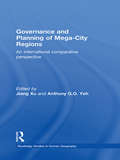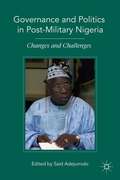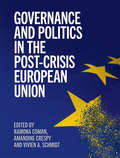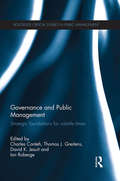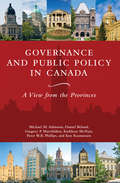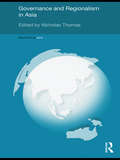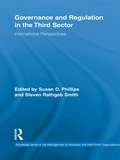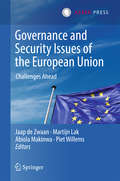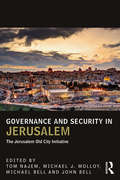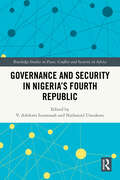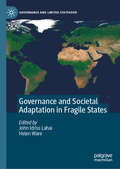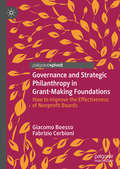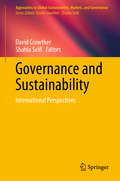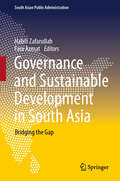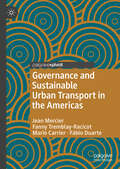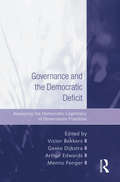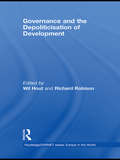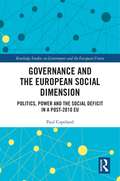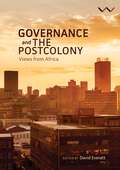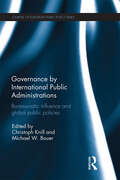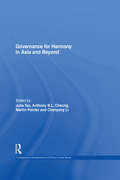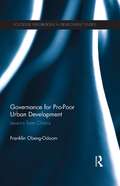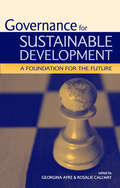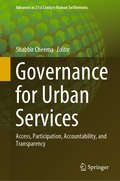- Table View
- List View
Governance and Planning of Mega-City Regions: An International Comparative Perspective (Routledge Studies in Human Geography)
by Jiang XuNeoliberalism’s market revolution has had a tremendous effect on contemporary mega-city regions. The negative consequences of market-oriented politics for territorial growth have been recognized. While a lot of attention has been given to how planners and policy makers are fighting back political fragmentation through innovative governance and planning, little has been done to reveal such practices through an international comparative perspective. Governance and Planning of Mega-City Regions provides a comparative treatment and examination of how new approaches in governance and planning are reshaping mega-city regions around the world. The contributors highlight how European mega-city regions are evolving and how strategic intervention is being redefined to enable the integration of urban qualities in a multi-level governance environment; how traditional federal countries in North America and Australia see the promise of major policies and development initiatives finally moving ahead to herald a more strategic intervention at national and regional scales; and how transitional economies in China witness the rise of state strategies to control the articulation of scales and to reassert the functional importance of state in a growing diffused power context. This book offers case studies written from a variety of theoretical and political perspectives by world leading scholars. It will appeal to upper level undergraduates, postgraduates, researchers, and policymakers interested in urban and regional planning, geography, sociology, public administrations and development studies.
Governance and Politics in Post-Military Nigeria
by Said AdejumobiThis edited collection is the product of a National Research Working Group (NRWG) established by Said Adejumobi and supported by the Open Society Initiative for West Africa (OSIWA). It analyzes the progress made in Nigeria since the return to democratic rule in 1999 and the prospects of democratic consolidation in the country.
Governance and Politics in the Post-Crisis European Union
by Vivien A. Schmidt Amandine Crespy Ramona ComanThe European Union of today cannot be studied as it once was. This original new textbook provides a much-needed update on how the EU's policies and institutions have changed in light of the multiple crises and transformations since 2010. An international team of leading scholars offer systematic accounts on the EU's institutional regime, policies, and its community of people and states. Each chapter is structured to explain the relevant historical developments and institutional framework, presenting the key actors, the current controversies and discussing a paradigmatic case study. Each chapter also provides ideas for group discussions and individual research topics. Moving away from the typical, neutral account of the functioning of the EU, this textbook will stimulate readers' critical thinking towards the EU as it is today. It will serve as a core text for undergraduate and graduate students of politics and European studies taking courses on the politics of the EU, and those taking courses in comparative politics and international organizations including the EU.
Governance and Public Management: Strategic Foundations for Volatile Times (Routledge Critical Studies in Public Management)
by Charles Conteh David K. Jesuit Thomas J. Greitens Ian RobergeThe key difference between success and failure for most governance systems is adaptation, specifically the ability to resolve the existing social, cultural, economic and environmental challenges that constrain adaptation. Local, regional and national systems differ in how they are designed to organize effective participation and create innovative ideas for missions, goals, strategies and actions. They also differ in how they build the effective coalitions needed to adopt, guide and protect strategies and actions during implementation, and how to build competence and knowledge to sustain implementation. This book presents the strategic foundations for government’s role in fostering and adapting to societal transformation in a volatile world. It shifts the focus of the discipline from an overtly retrospective analysis to a prospective analysis, incorporating the role of foresight techniques and instruments. Above all, it stimulates debate about the practical implications of governance as an emergent future-oriented framework of public management. This challenging book aims to facilitate dialogue and discussion between academics and practitioners, and encourage advanced students to take a new perspective on Public Management during these volatile times.
Governance and Public Policy in Canada: A View from the Provinces
by Johnson-Shoyama-Graduate SchoolGovernance and Public Policy in Canada lays the foundation for a systematic analysis of policy developments, shaped as they are by multiple players, institutional tensions, and governance legacies. Arguing that provinces are now the most central site of governance and policy innovation, the book assesses the role of the provinces and places the provincial state in its broader economic, institutional, social, and territorial context. The aim throughout is to highlight the crucial role of provinces in policy changes that directly affect the lives of citizens. Three key themes unify this book. First, it addresses the role of policy convergence and divergence among provinces. Although the analysis acknowledges enduring differences in political culture and institutions, it also points to patterns of policy diffusion and convergence in specific areas in a number of provinces. Second, the book explores the push and pull between centralization and decentralization in Canada as it affects intergovernmental relations. Third, it underscores that although the provinces play a greater role in policy development than ever before, they now face a growing tension between their expanding policy ambitions and their capacity to develop, fund, implement, manage, and evaluate policy programs. Governance and Public Policy in Canada describes how the provincial state has adapted in the context of these changing circumstances to transcend its limited capacity while engaging with a growing number of civil society actors, policy networks, and intergovernmental bodies.
Governance and Regionalism in Asia (Politics in Asia)
by Nicholas ThomasIn the decade since the Asian financial crisis the ten states of Southeast Asia that form ASEAN, together with China, Japan and South Korea have formed the basis of a community intended to support the well-being of its member states, markets and peoples. This highly successful regionalisation was not anticipated by the region’s leaders, however, and as a result, policy makers are increasingly talking about ‘meeting fatigue’ and the need to find a better way to govern regional affairs. Among the reforms being considered is a shift towards a more rules-based culture as well as the more explicit incorporation of both private sector and civil society organisations into the policy processes. In short, ASEAN+3 is seeking to develop new norms and processes for its networks and institutions. This book explores the pressures currently influencing East Asian regionalist policy debates, analysing the trend towards deeper integration and the emergence of a governance model for managing regional processes. Combining state and subnational perspectives in conjunction with an examination of the role of the business community and civil society organisations, this book highlights the policy challenges confronting regionalism and governance in East Asia, including key issues such as the rule of law, financial cooperation and a case study on disaster management.
Governance and Regulation in the Third Sector: International Perspectives (Routledge Studies in the Management of Voluntary and Non-Profit Organizations)
by Steven Rathgeb Smith Susan D. PhillipsGovernance and Regulation in the Third Sector brings together scholars and experienced practitioners from different countries to investigate the relationship between regulation and relational governance for the third sector in a comparative context. Each chapter reviews recent regulatory changes in the country in question. To what extent are there significant convergences in these reforms and what are the implications for the third sector? Is there any evidence that the foundational architecture for a more collaborative relationship between the state and the third sector has been laid? Overall, the book reveals that the reality of the supposedly new collaborative relationships and the impacts of regulatory reform are quite different from what contemporary theories of public management would have us believe. Recognizing the gap between theory and reality, the chapters explore some of the outstanding challenges for regulatory reform for the third sector.
Governance and Security Issues of the European Union
by Jaap De Zwaan Martijn Lak Abiola Makinwa Piet WillemsAt present, Europe is confronted with a number of serious common and global challenges, the most important being the economic crisis, migration issues, geopolitical tensions at its external borders, terrorism, as well as climate change and environmental challenges. These developments have a huge impact on the stability and security of the continent as a whole and on each individual European country. Europe, more particularly the European Union, has to organise its governance and security infrastructure in such a way that it can cope with these global threats. This book collects a number of topics and themes connected to the governance and/or security dimensions of EU co-operation. The Parts of the book deal respectively with: the values and general principles of EU co-operation; institutional aspects of EU co-operation; a number of individual policy domains; areas of European criminal law; the external relations of the EU; and the future functioning of EU co-operation as a whole.
Governance and Security in Jerusalem: The Jerusalem Old City Initiative (UCLA Center for Middle East Development (CMED) series)
by Michael Bell John Bell Tom Najem Michael J. MolloyGovernance and Security in Jerusalem is the second in a series of three books which collectively present in detail the work of the Jerusalem Old City Initiative, or JOCI, a major Canadian-led Track Two diplomatic effort, undertaken between 2003 and 2014. The aim of the Initiative was to find sustainable governance solutions for the Old City of Jerusalem, arguably the most sensitive and intractable of the final status issues dividing Palestinians and Israelis. This book presents a collection of studies commissioned by the Initiative in aid of its work on the Special Regime. It is split into three parts, Part I provides background papers on governance and security issues; Part II presents Palestinian and Israeli partner perspectives on governance options for a special regime, and the Part III delivers partner perspectives on security studies for a special regime. The studies written by the Israeli and Palestinian partners provide important background and historical context for JOCI's work on security and governance. The position papers, presented in their original form, greatly influenced the development of the Special Regime governance model. Offering a unique insight on a range of governance and security issues in Jerusalem, this book will be of great significance to the policy-making community and students and scholars with an interest in Middle East politics, the Israeli-Palestinian conflict and the Middle East peace process.
Governance and Security in Nigeria's Fourth Republic (Routledge Studies in Peace, Conflict and Security in Africa)
by V. Adefemi Isumonah Nathaniel UmukoroThis book explores the link between the nature of governance and various dimensions of security in Nigeria since the beginning of the fourth republic in 1999.The book begins by laying out the expectations of governance following the restoration of democratic rule. Failure to meet these expectations of governance over the subsequent 25 years has led to resistance to authority structures and privileged groups, who, in turn, in their effort at defending their positions, employ coercion that has endangered the security of Nigeria. This book is different from some previously published books in the field because it engages Nigeria’s security challenges in their abstract and concrete forms and connects governance indicators with security (or insecurity), taking a cue from key themes in state-society and intergroup relations. This book juxtaposes different governance indicators against various dimensions of security, including physical, economic, food and so on, in order to assess whether there is a correlation between the quality of governance in Nigeria and the country’s diverse security challenges.At a time of increasing conflict in Nigeria, this book’s analysis will be valuable for researchers across Political Science, History, Security Studies, Law and African Studies.
Governance and Societal Adaptation in Fragile States (Governance and Limited Statehood)
by Helen Ware John Idriss LahaiThis book examines the various ways in which some fragile states in the Global South (or states with limited statehood) have adopted, and adapted to, processes of governance in their quests to address the socialized problems affecting their societies. It tells the story of these states’ resilience in the societal adaptation to a liberalized notion of governance. In addition to comparative case studies, the book also analyzes the engendered interplay of culture, economics, and politics in the creation of people-centric governance reforms. The contributing authors shed light on weak states’ often constructive engagement in the promotion of state governance under a variety of societal conditions, adverse or otherwise, and on their ability to remain resilient despite the complexities of the political and economic challenges they face.
Governance and Strategic Philanthropy in Grant-Making Foundations: How to Improve the Effectiveness of Nonprofit Boards
by Giacomo Boesso Fabrizio CerbioniThis book discusses the role of grant-making foundations in supporting local communities, and how effective governance can contribute to greater success of the social projects they finance. The book considers the extent to which granting foundations act as social investment banks or strategic philanthropists, and identifies possible areas of evolution and improvement in the granting process of foundations similar to other innovative firms. It seeks to explore the possibility of foundations becoming a reference point in the Third Sector for innovativeness and risk taking.
Governance and Sustainability: International Perspectives (Approaches to Global Sustainability, Markets, and Governance #8)
by David Crowther Shahla SeifiThis book explores the concepts of sustainability and governance in relation to the governance of corporations – hence the ubiquity of the term corporate governance – and other bodies. It examines how these concepts are regularly used by politicians and by the media. The two concepts are however largely treated as being separate and discrete, and given equal coverage. The argument in this book is that the two concepts are inter-related and that good governance is a prerequisite for sustainability. The focus of the book therefore is different from most, as it seeks to integrate these two important issues.The approach used in this book is based on the tradition of the Social Responsibility Research Network – a worldwide body of scholars that, over its 20-year history, has sought to broaden the discourse and to treat all research as inter-related and business-relevant.The book examines diverse aspects of the changes to corporate and institutional behaviour that have recently manifested by focusing on these two aspects of sustainable development. Thus, the authors explore engagement and partnership between organisations, in order to consider the extent to which the focus has changed so much that we need to think about new approaches to our understanding of sustainability and differing effects in practice. The international mix of authors makes this an original contribution, sharing some of the best ideas from around the world.
Governance and Sustainable Development in South Asia: Bridging the Gap (South Asian Public Administration)
by Habib Zafarullah Fara AzmatThis edited volume analyzes South Asian public administration and its role in development through the lens of SDG 16. Chapters explore how SDG 16 has influenced the development of effective and accountable public institutions and the initiatives taken within this region to promote an inclusive society, provide access to justice for all, and build effective, accountable, and inclusive institutions at all levels. Each case presented offers best practices, the challenges faced, and the opportunities SDG 16 provides for regional and national development, as well as valuable insights into the transfer of knowledge and learning within the South Asian region and for broader “South-South” and “South-North” exchange. The book is intended for policymakers, businesses, civil society organizations as well as academics across research fields spanning management, social innovation, and corporate sustainability, who are pursuing research on public administration, governance and the SDG Agenda.
Governance and Sustainable Urban Transport in the Americas
by Jean Mercier Fanny Tremblay-Racicot Mario Carrier Fábio DuarteThis volume explores the governance patterns of three cities of the Americas, Seattle, Montreal, and Curitiba, which all present different but interesting cases in dealing with sustainable urban transport challenges. The authors study empirical data from these three cities to analyze how specific governmental and policy instruments (planning, consultation and market mechanisms for example) were implemented in each case. Through concepts coming from policy studies and sociology, for example, such as path dependency, institutional culture and transaction costs, the three cities are also looked at in a broader perspective in order to better understand how they deal differently with their common challenges.
Governance and the Democratic Deficit: Assessing the Democratic Legitimacy of Governance Practices
by Menno Fenger Victor Bekkers Geske DijkstraIt is widely acknowledged that we are witnessing a major transformation of public policy making, a transformation which has been labelled as a change from 'government' to 'governance'. Governance is used to describe policy making and implementation without a central authority in a non-hierarchical, network-like structure through negotiation and cooperation between public and private actors at one or across different political levels. This comprehensive volume combines empirical analysis and normative assessment of governance practices, providing a systematic approach based on a framework for assessing democratic legitimacy. It addresses different modes of governance at the local/regional, national, European and international levels. The volume assesses the alleged 'democratic deficit' of these new governance practices and as such is ideally suited to courses on public administration.
Governance and the Depoliticisation of Development (Routledge/GARNET series)
by Wil Hout Richard RobisonThis book is about the way ‘governance’ has become the new orthodoxy of development, following earlier failed attempts at building working market economies through policy reform in developing countries. Considering how its proponents define ‘good governance’, the contributors to this volume assess why programmes of governance building in developing countries have proven to be no less problematic than the previous agendas of market reform. Governance and the Depoliticisation of Development challenges ideas that deeper political and social problems of development may be addressed by institutional or governance fixes. It examines the principles and prescriptions of ‘good’ governance as part of larger conflicts over power and its distribution. The volume provides: a series of case studies from Latin America, Middle East and Asia a link to current theorising on neoliberalism and the post-Washington Consensus a focus on governance at the global and national levels from a comparative perspective The collection will be essential reading for researchers and scholars of international political economy, governance studies and political science.
Governance and the European Social Dimension: Politics, Power and the Social Deficit in a Post-2010 EU (Routledge Studies on Government and the European Union)
by Paul CopelandProviding a comprehensive and authoritative analyses of the impact of the Eurozone crisis on the European social dimension since 2010 ・ understood as the European Union’s (EU) competence in employment and social policy ・ this book focusses on developments in five policy areas (employment, poverty and social exclusion, pensions, wages and healthcare), all of which form part of the EU’s economic reform strategy, Europe 2020. It combines original empirical material and uses a unique theoretical approach to analyse the issue of EU governance and reveals that ‘progress’ under Europe 2020 has its consequences; notably a strengthened Brussels-led neoliberal prescription for EU social and employment policy problems. By drawing insights from political sociology and the strategic-relational approach to actors/institutions, this book will be of interest to students and scholars interested in EU politics, EU governance, political sociology, public policy and European integration.
Governance and the postcolony: Views from Africa
by David EverattCivil society, NGOs, governments, and multilateral institutions all repeatedly call for improved or ‘good’ governance – yet they seem to speak past one another. Governance is in danger of losing all meaning precisely because it means many things to different people in varied locationsThis is especially true in sub-Saharan Africa. Here, the postcolony takes many forms, reflecting the imperial project with painful accuracy. Offering a set of multidisciplinary analyses of governance in different sectors (crisis management, water, food security, universities), in different locales across sub-Saharan Africa, and from different theoretical approaches (network to adversarial network governance); this volume makes a useful addition to the growing debates on ‘how to govern’. It steers away from offering a ‘correct’ definition of governance, or from promoting a particular position on postcoloniality. It gives no neat conclusion, but invites readers to draw their own conclusions based on these differing approaches to and analyses of governance in the postcolony.As a robust, critical assessment of power and accountability in the sub-Saharan context, Governance and the Postcolony: Views from Africa brings together topical case studies that will be a valuable resource for those working in the field of African international relations, public policy, public management and administration.
Governance by International Public Administrations: Bureaucratic Influence and Global Public Policies (ISSN)
by Christoph Knill Michael W. BauerAs the demand and necessity for greater international and transnational cooperation increase, the bureaucratic bodies of international organizations are receiving ever more scholarly attention. However, the relevance of International Public Administrations (IPAs) for global policy-making remains neither empirically nor theoretically well understood, and yet little systematic knowledge is available about the influence international bureaucracies may have on policy-making. What makes international bureaucracies influential? Are the sources of their influence on policy-making comparable to that of national public administrations? Is there a need to reflect on other factors than known from the analysis of national bureaucracies or for re-assessing the impact of traditional factors of influence in multilevel constellations? Is there a systematic link between intra-organizational structures and the behavior of the personnel of international bureaucracies and the policy output of their organizations? What are the effects of international bureaucracies’ role for particular policies or policy constellations? The different contributions in this volume address these questions from different conceptual perspectives and focus on different tools of administrative governance. This book was originally published as a special issue of the Journal of European Public Policy.
Governance for Harmony in Asia and Beyond (Comparative Development and Policy in Asia)
by Chenyang Li Anthony B. Cheung Julia Tao Martin PainterHarmony has become a major challenge for modern governance in the twenty-first century because of the multi-religious, multi-racial and multi-ethnic character of our increasingly globalized societies. Governments all over the world are facing growing pressure to integrate the many diverse elements and subcultures which make up modern pluralistic societies. This book examines the idea of harmony, and its place in politics and governance, both in theory and practice, in Asia, the West and elsewhere. It explores and analyses the meanings, mechanisms, dimensions and methodologies of harmony as a normative political ideal in both Western and Asian philosophical traditions. The book argues that in Western political thought - which sees politics as primarily concerned with resolving social conflicts and protecting individual rights - the concept of harmony has often been neglected. In contrast, since earliest times harmony or 'he' has been a profound theme in Confucian thought, and current leaders of many East Asian governments, and the Chinese government, have explicitly declared that the realisation of a harmonious society is their aim. The book also assesses how harmony is pursued, jeopardized or deformed in the real world of politics, based upon empirical analysis of a variety of different cultural, social and political contexts, including: China, Hong Kong, Singapore, Malaysia, Singapore, Vietnam, Denmark, Latin America and the Scandinavian countries. It shows how harmony as an organizing concept can help to promote new thinking in governance, and overcome problems of modern-day governance like distrust, adversarial conflicts, hyper-individualism, coercive state intervention, and free-market alienation. It also discusses the potential problems posed by the pursuit of harmony, in particular in the grave threat of totalitarianism, and considers how these risks could best be mitigated.
Governance for Justice and Environmental Sustainability: Lessons across Natural Resource Sectors in Sub-Saharan Africa
by Rachel Wynberg Merle SowmanUnderstanding the governance of complex social-ecological systems is vital in a world faced with rapid environmental change, conflicts over dwindling natural resources, stark disparities between rich and poor and the crises of sustainability. Improved understanding is also essential to promote governance approaches that are underpinned by justice and equity principles and that aim to reduce inequality and benefit the most marginalised sectors of society. This book is concerned with enhancing the understanding of governance in relation to social justice and environmental sustainability across a range of natural resource sectors in Sub-Saharan Africa. By examining governance across various sectors, it reveals the main drivers that influence the nature of governance, the principles and norms that shape it, as well as the factors that constrain or enable achievement of justice and sustainability outcomes. The book also illuminates the complex relationships that exist between various governance actors at different scales, and the reality and challenge of plural legal systems in much of Sub-Saharan Africa. The book comprises 16 chapters, 12 of them case studies recounting experiences in the forest, wildlife, fisheries, conservation, mining and water sectors of diverse countries: Madagascar, Zimbabwe, Botswana, Namibia, South Africa, Zambia, Mozambique, Sierra Leone and Cameroon.Through insights from these studies, the book seeks to draw lessons from the praxis of natural resource governance in Sub-Saharan Africa and to contribute to debates on how governance can be strengthened and best configured to meet the needs of the poor, in a way that is both socially just and ecologically sustainable.
Governance for Pro-Poor Urban Development: Lessons from Ghana (Routledge Explorations in Development Studies)
by Franklin Obeng-OdoomThe world development institutions commonly present 'urban governance' as an antidote to the so-called 'urbanisation of poverty' and 'parasitic urbanism' in Africa. Governance for Pro-Poor Urban Development is a comprehensive and systematic analysis of the meaning, nature, and effects of 'urban governance' in theory and in practice, with a focus on Ghana, a country widely regarded as an island of good governance in the sub region. The book illustrates how diverse groups experience urban governance differently and contextualizes how this experience has worsened social differentiation in cities. This book will be of great interest to students, teachers, and researchers in development studies, and highly relevant to anyone with an interest in urban studies, geography, political economy, sociology, and African studies.
Governance for Sustainable Development: A Foundation for the Future
by Rosalie CallwayAs the process of globalization continues and power imbalances between decision-making institutions become increasingly apparent, the need for a critical assessment of the way in which we manage our interaction with the natural environment becomes ever more urgent. Good governance was identified at the World Summit on Sustainable Development as a critical factor for ensuring successful sustainable development. This book builds on the briefing papers that were presented at the Summit, taking further the discussions of the WEHAB agenda (Water, Energy, Health, Agriculture and food, and Biodiversity - the five international priority sectors highlighted by UN Secretary General Kofi Annan). This is a unique offering on the role and reform of global institutions and processes, raising issues that have previously been neglected in international discussions.
Governance for Urban Services: Access, Participation, Accountability, and Transparency (Advances in 21st Century Human Settlements)
by Shabbir CheemaThis book examines three vital issues in urbanization and democratization: the institutional structures and processes of urban local governance to improve access to urban services; their outcomes in relation to low-income groups’ access to services, citizen participation in local governance, accountability of local leaders and officials, and transparency in local governance; and the factors that influence access to urban services, especially for the poor and marginalized groups. Further, it describes decentralization policies, views of the residents of slums on the effectiveness of government programs, and innovations in inclusive local governance and access to urban services.
